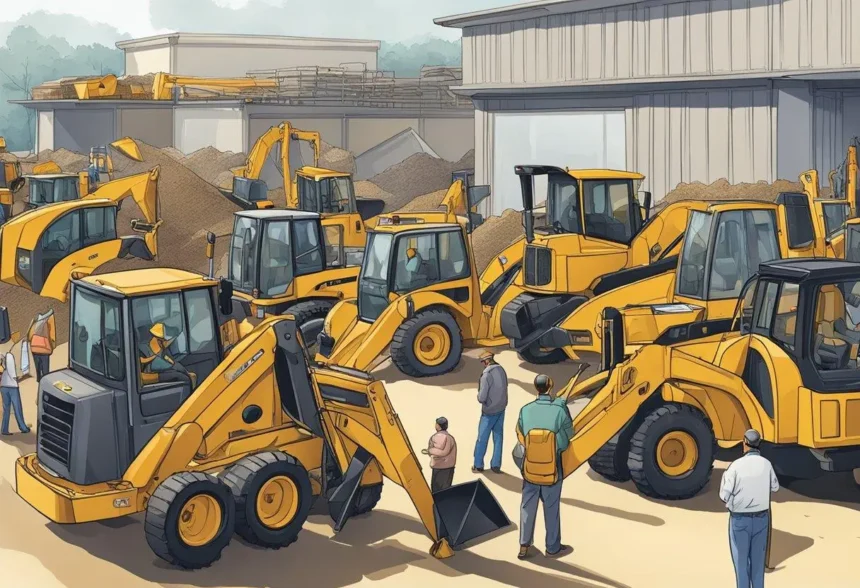Construction equipment auctions are a popular way for companies to acquire the machinery they need to complete their projects. These auctions offer a wide variety of equipment, from excavators and bulldozers to cranes and loaders, at prices that are often below market value. For buyers who are looking to save money on their equipment purchases, construction equipment auctions can be an attractive option.
One of the main benefits of construction equipment auctions is the opportunity to purchase equipment at a lower cost than buying new. This is especially important for smaller companies or contractors who may not have the budget to purchase brand-new equipment. Additionally, auctions allow buyers to inspect the equipment before purchasing, ensuring that they are getting a quality product. Auctions also provide a level playing field for all buyers, regardless of the size of their company or their purchasing power.
Another advantage of construction equipment auctions is the convenience they offer. Many auctions take place online, allowing buyers to participate from anywhere in the world. This eliminates the need for travel and enables buyers to easily compare prices and equipment from multiple auctions. Overall, construction equipment auctions are a valuable resource for companies looking to acquire the equipment they need to complete their projects.
Understanding Construction Equipment Auctions
Construction equipment auctions are a popular way for contractors, construction companies, and individuals to purchase used equipment at a lower cost than buying new. Understanding the different types of auctions, the benefits of buying at auction, and key auction terminology can help buyers make informed decisions and get the best deals.
Types of Auctions
There are several types of construction equipment auctions, including online auctions, live auctions, and sealed bid auctions. Online auctions are conducted entirely over the Internet, while live auctions are held in person at a physical location. Sealed bid auctions require buyers to submit their bids in writing, and the highest bidder wins the equipment.
Benefits of Buying at Auction
One of the main benefits of buying construction equipment at auction is the potential cost savings compared to buying new. Auctions also allow buyers to see a wide variety of equipment in one place, making it easier to compare models and prices. Additionally, auctions can be a quick way to acquire equipment, with many auctions taking place over just a few days.
Key Auction Terminology
Understanding key auction terminology is important for buyers to participate in auctions effectively. Some common terms include:
- Reserve price: The minimum price the seller is willing to accept for the equipment.
- Bid increment: The minimum amount by which a bid must be raised.
- Buyer’s premium: A fee charged to the buyer on top of the winning bid price.
- As-is: Indicates that the equipment is being sold in its current condition, with no guarantees or warranties.
By understanding the different types of auctions, the benefits of buying at auction, and key auction terminology, buyers can make informed decisions and get the best deals on construction equipment.
Preparing for a Construction Equipment Auction
When preparing for a construction equipment auction, it is important to do some research and planning beforehand. This can help you make informed decisions and increase your chances of getting the equipment you need at a fair price. Here are some key steps to take:
Researching Equipment
Before the auction, it is important to research the equipment you are interested in. This can help you determine its value and set a budget for bidding. You can use online resources such as equipment valuation guides and auction listings to get an idea of prices and availability. It is also a good idea to visit local dealerships and rental companies to compare prices and features.
Inspecting Equipment Before Bidding
It is important to inspect the equipment thoroughly before bidding. This can help you identify any potential issues or repairs that may need to be made. You can bring a mechanic or equipment expert with you to help with the inspection. Take note of any damage or wear and tear, as well as the overall condition of the equipment.
Understanding the Bidding Process
It is important to understand the bidding process before the auction begins. This can help you avoid overbidding or missing out on the equipment you need. Be sure to register for the auction and get a bidder number. Set a maximum bid for each piece of equipment and stick to it. Keep in mind that there may be additional fees such as buyer’s premium and sales tax.
Financing Options
If you plan to finance the equipment, it is important to explore your options beforehand. You can talk to lenders and financial institutions to get pre-approved for a loan. This can help you determine your budget and avoid overspending at the auction. Be sure to read the loan terms and conditions carefully and understand the interest rates and repayment terms.
By following these steps, you can be well-prepared for a construction equipment auction and increase your chances of getting the equipment you need at a fair price.
Participating in an Auction
Participating in a construction equipment auction can be an exciting and cost-effective way to acquire the equipment you need. However, it’s important to understand the process and be prepared before placing your bid. In this section, we’ll cover the key aspects of participating in an auction.
Registration and Entry Requirements
Before you can participate in an auction, you’ll need to register with the auction company. This typically involves providing personal and financial information, such as your name, address, and credit card details. Some auction companies may also require a deposit or proof of insurance.
In addition to registration, you’ll need to meet any entry requirements for the auction. This may include providing proof of industry affiliation or a valid driver’s license. Be sure to check the auction’s website or contact the company directly to confirm the requirements.
Live Auctions vs. Online Auctions
Construction equipment auctions can be conducted in person or online. Live auctions allow you to inspect the equipment in person and interact with other bidders, while online auctions offer the convenience of bidding from anywhere with an internet connection.
It’s important to familiarize yourself with the specific rules and procedures for each type of auction. For example, in a live auction, you may need to register in person and obtain a bidder’s number, while in an online auction, you may need to submit a bid deposit in advance.
Bidding Strategies
When it comes to bidding in an auction, there are several strategies you can use to increase your chances of success. One common approach is to set a maximum bid and stick to it, avoiding the temptation to get caught up in a bidding war.
Another strategy is to wait until the last minute to place your bid, to avoid driving up the price early on. However, this approach can be risky if you miss your chance to bid or if the auction ends abruptly.
After the Auction: Payment and Pick-up
If you are the winning bidder, you’ll need to complete the payment process and arrange for pick-up or delivery of the equipment. Be sure to read the auction company’s terms and conditions carefully, as they may include specific requirements or deadlines.
In some cases, you may need to provide proof of insurance or a valid driver’s license before taking possession of the equipment. It’s also important to inspect the equipment thoroughly before finalizing the transaction, as most auctions are “as is, where is” and do not offer any warranties or guarantees.
Overall, participating in a construction equipment auction can be a great way to find high-quality equipment at a competitive price. By understanding the registration process, auction rules, and bidding strategies, you can increase your chances of success and make the most of your investment.
Legal and Regulatory Considerations
Warranties and Guarantees
When participating in a construction equipment auction, it is important to understand the warranties and guarantees that are offered by the auctioneer. Buyers should carefully review the terms and conditions of the auction to determine what warranties and guarantees are included. Some auctions may offer limited warranties or guarantees, while others may offer none at all. Buyers should also be aware that any warranties or guarantees offered may be limited to specific items or conditions.
Transfer of Ownership
Another important consideration when participating in a construction equipment auction is the transfer of ownership. Buyers should ensure that they understand the process for transferring ownership of the equipment they purchase. This may include completing paperwork or obtaining specific documentation. Buyers should also be aware of any fees or costs associated with transferring ownership.
Compliance with Safety Standards
Finally, buyers should ensure that any equipment they purchase at a construction equipment auction is compliant with all applicable safety standards. This may include ensuring that the equipment has all necessary safety features and that it has been properly maintained. Buyers should also be aware of any safety regulations that may apply to the use of the equipment and should take necessary steps to ensure compliance.
Overall, buyers should carefully review all legal and regulatory considerations when participating in a construction equipment auction. By understanding the warranties and guarantees offered, the process for transferring ownership, and the applicable safety standards, buyers can make informed decisions and ensure a successful auction experience.
Market Trends and Analysis
Current Market Trends
The construction equipment auction market has been experiencing steady growth over the past few years. The demand for used construction equipment has been increasing due to the rising costs of new equipment. This trend has been driven by construction companies looking to save money by purchasing used equipment that is still in good condition.
Another trend in the market is the increasing popularity of online auctions. Online auctions have made it easier for buyers to purchase equipment from anywhere in the world, and for sellers to reach a wider audience. This has led to increased competition and higher prices for some equipment.
Predicting Future Auction Prices
Predicting future auction prices for construction equipment can be difficult due to the volatility of the market. However, some factors can be used to make educated guesses. The age, condition, and hours of use of the equipment are important factors to consider. Equipment that is in good condition and has low hours of use will likely sell for higher prices.
Another factor to consider is the supply and demand of the equipment. If there is a high demand for a particular type of equipment and a limited supply, prices are likely to increase. Conversely, if there is a low demand and a surplus of equipment, prices are likely to decrease.
Impact of Economic Factors
Economic factors such as interest rates, inflation, and the overall health of the construction industry can also impact auction prices. When interest rates are low, it can be easier for buyers to finance their purchases, which can lead to higher prices. Inflation can also drive prices up as the cost of new equipment increases.
The overall health of the construction industry is also an important factor to consider. When the industry is booming and there is a lot of construction activity, prices for used equipment are likely to be higher. Conversely, when the industry is slow, prices are likely to be lower.
In conclusion, the construction equipment auction market is experiencing steady growth, with increasing demand for used equipment and the popularity of online auctions. Predicting future auction prices can be difficult, but factors such as age, condition, and supply and demand can be used to make educated guesses. Economic factors such as interest rates, inflation, and the overall health of the construction industry can also impact auction prices.
Case Studies
Successful Auction Purchases
In this section, we will discuss some successful auction purchases made by construction companies. One example is the purchase of a used excavator at an auction in Ohio. The excavator was in good condition and had low hours, making it a great deal for the company. They were able to use the excavator on several projects and it performed well, saving them time and money.
Another example is a construction company that purchased a used backhoe at an auction in Texas. The backhoe was in excellent condition and had low hours, making it a great investment for the company. They were able to use the backhoe on several projects and it performed well, making their work easier and more efficient.
Common Pitfalls to Avoid
In this section, we will discuss some common pitfalls to avoid when purchasing equipment at an auction. One common mistake is not doing enough research on the equipment before bidding. It’s important to know the market value of the equipment, as well as its condition and history. This will help you make an informed decision and avoid overpaying for equipment that may not be in good condition.
Another pitfall is not inspecting the equipment before bidding. It’s important to inspect the equipment thoroughly to ensure that it’s in good condition and will meet your needs. If you’re not able to inspect the equipment in person, consider hiring a third-party inspector to do it for you.
Overall, construction equipment auctions can be a great way to save money on equipment purchases. However, it’s important to do your research and be prepared to avoid common pitfalls. By following these tips, you can make smart and successful purchases at construction equipment auctions.
Resources and Tools
When it comes to participating in construction equipment auctions, having access to the right resources and tools can make a significant difference. Here are a few essential resources and tools that can help you make informed decisions:
Auction Calendars
Auction calendars are an excellent resource for anyone looking to buy or sell construction equipment at an auction. They provide a comprehensive list of upcoming auctions, along with details such as the location, date, and time. Some auction calendars also provide information on the type of equipment that will be available at each auction.
Equipment Valuation Tools
Determining the value of construction equipment can be challenging, especially if you are new to the auction scene. Fortunately, there are several online tools available that can help you estimate the value of equipment. These tools use data such as the year, make, and model of the equipment, along with its condition and usage, to provide an estimated value.
Networking in the Auction Community
Networking is crucial in the construction equipment auction community. Building relationships with other buyers and sellers can help you stay informed about upcoming auctions, learn about new equipment, and connect with potential buyers or sellers. Attending industry events and joining online forums or social media groups can help you expand your network and stay up-to-date on industry news.
By utilizing these resources and tools, you can increase your chances of success in construction equipment auctions.







